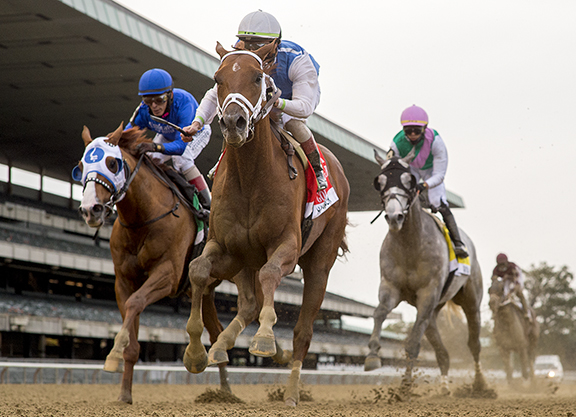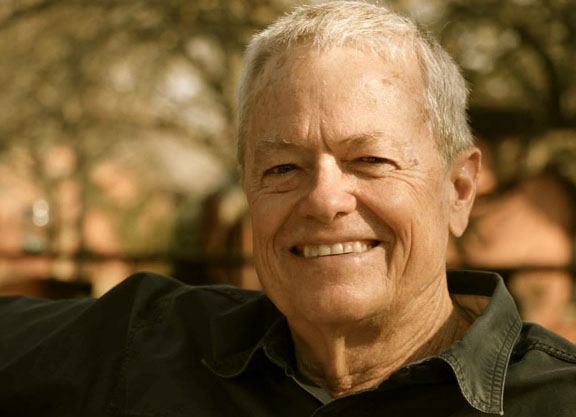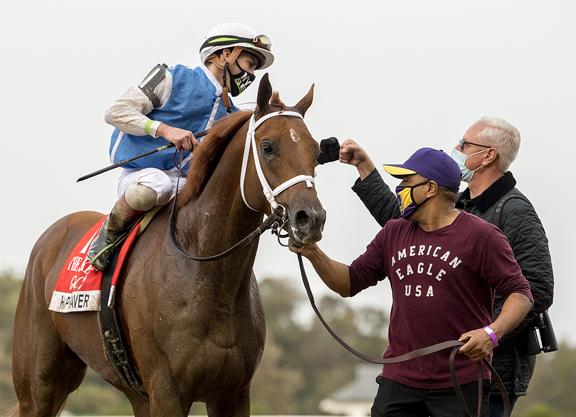By Chris McGrath
You have to shake out a lot of grit from the riverbed before you glimpse that glint of gold.
John Ropes started panning just about 40 years ago. He had a girl working for him at the time whose father, Andy Smithers, trained in Canada. When Ropes told her that he'd decided to buy a racehorse, she tried to save him.
“No,” she implored. “I'm telling you, don't do it.”
Ropes was adamant. He had always loved horses. His parents took him racing as a kid in Miami and, though the track wouldn't let you in until you were 21, in his college years he would drive out and make a bet with the doorman for the daily double.
“So she tried to talk me out of it,” Ropes recalls now. “Until finally she turned me over to her dad. And that was the beginning of the end!”
They claimed a horse at Gulfstream for $15,000 after he finished last, beaten 40 lengths.

Happy Saver wins the Jockey Club Gold Cup | Sarah K. Andrew photo
“Andy,” Ropes said. “Why did we buy this horse?”
“Look at those feet. Those are grass feet. They don't know what they're doing, running on the dirt.”
Smithers took the horse up to Woodbine and they won three allowance races that summer. This, however, was to be a thoroughgoing introduction to the business. The horse then fractured a leg, and they spent plenty of time and money failing to bring him back.
“But now I was hooked,” says Ropes. “I bought some other horses. Some turned out, some didn't. Then I decided to breed some fillies, and bought a farm in Ocala. That was 1985. At the time we were breeding and racing, and not selling; we built a track in the back and trained on the farm. But you can't be all things.”
So there were tweaks to the program, as he went along. Nowadays, Ropes breeds to sell. Obviously there are times when a mare needs to be “made,” times when an ugly duckling needs retaining, times when even a 2-year-old sale comes too soon. Hence he will always have a couple of youngsters persevering on the track, these days with Saffie Joseph, Jr.
But last fall Ropes made a decision. It was never too late to ask for help, especially from the agent he regards as the best in the business: Marette Farrell.
He hadn't even met her before he went to Keeneland last November, with maybe 60 or 70 pages turned down. “And Marette, she has a very nice way about her,” says Ropes. “But if she doesn't like a horse, you don't buy it. We looked at a lot. I mean, some of them were well-bred, nice families, good sire, and going for next-to-nothing. I'd say, 'Why aren't we buying that mare?' And she'd look at me and say, 'Because I don't like it.'”

Happy Saver's dam, Happy Week | Courtesy of Collier Mathes
But one she did like. She went to see Hip 1061 four times, taking Ropes twice.
“We're buying this mare,” she announced. “Just look at this family. This is the kind of mare you need.”
Happy Week was a 12-year-old daughter of Distorted Humor, and on her last visit to Keeneland had made $600,000 from the Wertheimer brothers at the September Yearling Sale. Little wonder: her maternal line was just about the best in America. Her dam was by the great broodmare sire Deputy Minister out of none other than Weekend Surprise, otherwise responsible for A.P. Indy and Summer Squall. She had, moreover, inherited enough ability to win five races, twice stakes-placed besides once passing the post third in a Grade II race (relegated for interference).
Yet her first foals had not done enough to retain a place in the program of her powerful owners. There had been a couple of minor winners by Giant's Causeway, a couple of outright duds, and she had lost her last foal. She had an unraced juvenile by Super Saver, with no works to his name, and was carrying a sibling by that sire–whose departure to Turkey was to be announced a few days later.
Ropes can't remember what they budgeted for the mare, but it was a lot more than the $30,000 they needed. In fact, Happy Week was the cheapest of the three mares they took home.
“We thought she was beautiful, just outstanding,” Ropes recalls. “Of course, it's one thing being beautiful, and another being able to produce. I guess people were just unwilling to take a shot on her, because she hadn't turned anything out. But that's why I had Marette with me. I wanted to make good decisions, not the knee-jerk ones I'd made way too many times in the past.”
Farrell was excited by the idea of breeding Happy Week to an A.P. Indy-line sire, to double up Weekend Surprise. After she safely delivered the Super Saver foal, a filly, the mare was duly sent to that under-rated achiever, Sky Mesa.
As it happens, the Super Saver filly also doubled Weekend Surprise into the top half of her pedigree: her sire is out of an A.P. Indy mare. And maybe that is the turbo driving her brother, who had meanwhile turned three and finally surfaced at Belmont in June.
“I'd been watching his works, which were okay,” Ropes says. “But I don't think Todd Pletcher tries to cash any tickets in the morning. Seems to me that he waits for his horses, doesn't need to get bullet works. So I was just blown away by how he handled that race. He was one-tenth of a second off the Grade I [Woody Stephens S.] earlier in the day. And he was eased across the finish line. Pretty phenomenal for a first-time starter.”
And it has been much the same, each step of the way. The Wertheimers' colt has surpassed every hope that Ropes could permit himself: first in a Saratoga allowance, then a stake at Laurel. After that there was even talk of the GI Preakness S., but instead Pletcher held him back for the GI Jockey Club Gold Cup. And Happy Saver–for it is he, of course–nipped through on the rail and suddenly found himself on course for the GI Breeders' Cup Classic itself.
“I think Pletcher has done a marvelous job conditioning this horse,” Ropes said with enthusiasm. “And I think he's going to be a brilliant 4-year-old. The other day, I was just hoping he would show up. Of course you always hope to win, but second or a third would still be pretty impressive in a Gold Cup. Yet it looked to me like he won fairly easily, and Irad [Ortiz, Jr.] was saying he had something left in his tank. So we'll see what happens next, but I'm very excited.”
Needless to say, there have been calls about buying the mare. But Farrell has been as clear in her counsel, now, as she was last November.
“You can spend millions and not get a horse like this,” she told Ropes. “This is a rare find. It's something everybody aspires to, but very few people get. Happy Week is a foundation mare. You could sell her for a bundle, but what would you buy to replace her?”

The weanling full-sister to Happy Saver | Courtesy of Collier Mathes
Happy Saver's little sister, however, is another story. She will go back to the same sale [hip 279] in which she was acquired in utero last November.
“I've never sold a weanling before,” admits Ropes. “But Marette said, 'Why not? Let's give it a shot. If she doesn't bring a number, you can bring her back.' When we nominated her to Keeneland, we had no idea what Happy Saver was going to do. Of course the fall-back is she might be a very good broodmare, after racing. I'm told that she's very, very similar to Happy Saver, in terms of conformation and size.”
The filly is being prepared by Collier Mathes at Chesapeake Farm, Kentucky. After the Gold Cup, Mathes rang Ropes and said: “I had a 24-hour watch on that filly. Now I got her bubble-wrapped.”
Ropes stresses his debt to all those who assist his program, from Farrell to Mathes; to Beth Bayer, who has prepared many of the Florida babies for sale; to his own team at Rosegrove Farm; to his local pre-trainers in Ocala, Niall Brennan and Gayle Woods; to Joseph and his staff at the track. What unites them in his service, Ropes says, is a single word: honesty.
“As you know, sometimes that can be hard to come by in the horse business,” Ropes reflects. “And these are very honest people. Sometimes brutally honest. When they come and look at your babies, and you ask them what they think, they say, 'Well, it's a little offset here, and I don't like this and I'm not wild about that.' And you go away depressed. But while I may not like the message, I never shoot the messenger.”
Recruiting the right team, finding the right stock, building a project: all attributes honed in the career that has helped Ropes fund his equine program. Ropes Associates, principally concerned in executive recruitment for luxury resort development, has worked in 22 different countries.
In bloodstock and business alike, Ropes tries to apply the same principles. He doesn't like debt, for instance, so hasn't ever been attracted to pinhooking. “But also, just being a little humble,” he emphasizes. “Realizing that you don't know all the answers; that you have to seek to find those answers. And, when things go right, you can't let it go to your head. I always recall the fellow that had Spend a Buck. First horse he ever owned, syndicated for $13 million. And he came to Ocala, bought a big farm, spent the bucks. Didn't have a program, and about four years later filed Chapter 7. So it's a humbling business.”
That said, Ropes doesn't deceive himself that there is always a right way and a wrong way. You can only seek the way that might work for your program.
“Everybody in the horse business has a theory, right?” he says with a chuckle. “My theory is: the dam throws the heart. Years ago, I had a trainer, 'Big' John Tammaro [Jr.]. He was one of the first to say, 'It's the heart that makes the horse.' This was back in the '80s. Later they started measuring heart size and whatnot; that became fairly standard. But back then it was quite revolutionary. He said, 'Unless it's a certain size, it can't produce the oxygen to the muscles to produce a stakes horse.'”
A black-type mare, then, demonstrably has the heart to throw a stakes horse herself. Happy Week appealed as one such, albeit she hadn't shown it. But if the dividends look like proving exceptionally prompt, Ropes has certainly paid his dues. With Happy Saver's little sister (already named Happy Charger), he knows by now to strike while the iron is hot.
“We had one once that won his maiden, a tick off the track record,” he recalls. “Then an allowance, and he was getting ready for the Breeders' Cup in a stakes race. I'd had offers for quite a bit. But then it rained, got muddy, and he fractured his ankle in the race. Everybody has stories like that in the horse business, I think. It's about when you pull your chips off the table. But then I've also had a horse that was crooked in both knees, they said we'd be lucky to give her away, and she ended up a stakes winner. So you never know.”
Years ago Ropes remembers being incautious enough to tell Tom Ventura of OBS that he was finally figuring this whole thing out. Ventura looked at him and started laughing. “You'll be the first person in the history of the business has done that,” he said. Hmm, thought Ropes. Wow. Okay.
But the addiction holds true.
“Once hooked, it's a disease,” he says. “And the only known cure is bankruptcy. But who couldn't love this wonderful industry? It has its faults, as we see, and we do need to get rid of those people that bring shame on it. But in what other sport does it take two phenomenal athletes together to win?
“There are some unique people in our industry. And it's all a team effort. You talk to different people, get a synthesis of opinions. We seek the advice of other farm managers, what they're doing for nutrition and so on. You learn something new every year. It all takes good people, and a bit of good fortune too.
“Marette keeps me from doing dumb things. But then out pops Happy Saver, and all of a sudden we look like geniuses–which is okay by me. But we have pictures all over the walls, at the farm, and people come in and say, 'Wow, this must be really great for you.' And I say, 'They don't give you pictures for when your horse loses.' As I say, it's a humbling business. The day you think you know all the answers is probably the day you need to exit.”
But once you know that, you know everything. And some happy day, some Happy Week, you'll sift that nugget that makes it all worthwhile.
Not a subscriber? Click here to sign up for the daily PDF or alerts.







